What is Utopia and why does it attract both hope and skepticism in equal measure? In a way that appears meaningful, it is a productive inner tensions between two tendencies: a positive optimistic utopianism and a negative utopian pessimism. A confrontation between the secular and theological, with the negative tendency joining forces with the conception of redemption. Utopians can easily be denounced as romantics who regard the past as a golden age, instead of acting in a concrete way towards shaping the future. Utopia is often examined together with the concept of defamed ideology. While ideology affects reality, utopia enacts “a dream on a ‘right’ and ‘just’ form of life.”
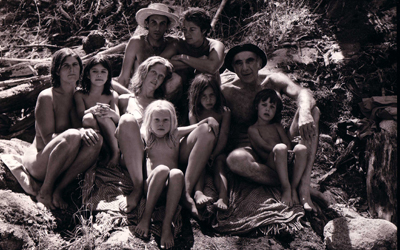
Peace and love are only half the story. Plot Outline: A documentary on the Black Bear Ranch Commune, an alternative living community founded in 1968 in the remote North Californian wilderness.
Typically, one identifies two aspects of utopianism: the critique of present reality and the presentation of the worthwhile future demanding realization; transcendence then serving as the basis for rejecting utopianism as a fantasy. This rejection of utopianism by notables such as Max Horkheimer, sustained, like Adorno and Herbert Marcuse, what should be termed a positive utopianism. This position was based on a belief in progress, on confidence in the revolutionary role of the proletariat, on humanity’s fundamental capacity for improvement, and on rationality which may become a complete way of life in future society.

There is for one, an impossibility of dropping out. The counter culture, whatever its historical precedents, whatever the worthiness of its aims, did discover that from technocracy there was no escape. That there was profound dissatisfaction with the bureaucratic mechanism of an advanced industrial society, is beyond question. The rub was ”becoming” in this context; of being born to the world and discovering oneself. And of making existential choices that determine the direction our life takes. Not much has changed. The issue of ”being” torn between embodied essence rather than the abstraction of a world based on equations.
Accordingly, the struggle between the divine and the mythical serves as the cornerstone for the political struggle and necessarily collides with the law. The law, instead of implementing justice, represents the violence which instituted the law in the first place. However, Walter Benjamin implicitly abandoned the naive revolutionary demand for justice, which is satisfied simply by replacing the present laws with others conceived as being more just. Such a demand appears as a mythical, violent contention, opposing the divine one. The pessimistic dimension in Walter Benjamin’s thought is revealed in his claim that the divine alone enables us to speak of “justice.” Since there is no place in secular history for this dimension – sometimes referred to as “messianic” – his utopianism strongly suggests a transformation of the utopian project. Real change is now conceived as possible only by the overthrow of history.
From this perspective, each revolutionary effort to realize utopia – with which he explicitly identifies – is revealed as a vanity of the mythic force that confronts the messianic. In contrast to Horkheimer’s and Adorno’s positive utopianism, in their early thinking, Benjamin incorporated two elements within the framework of his fundamentally pessimistic negative utopianism: the tradition of thought on redemption, and the utopian tradition…..
The very first literary idea of utopia was invented by Sir Thomas Moore in 1516. Since that time, the idea of what exactly makes a utopia has branched and grown into an uncountable amount of individual definitions. But it has not altered the desire to pursue the good life, particularly in America. They built their own communes , only to learn that transcendental ideals and prayer; and even group sex to not suffice to weld a community together.
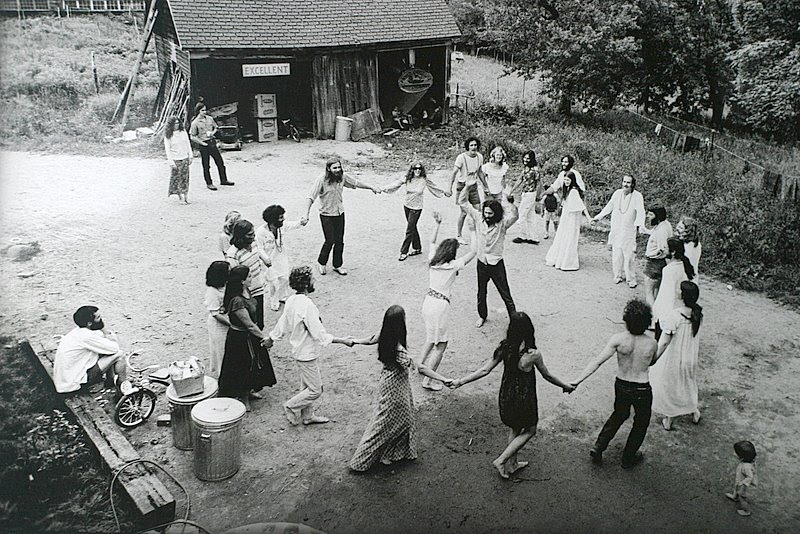
"When I explain this to my daughter, she’s not convinced. “That’s how your generation saw hippies” she says. “For my generation there’s a different definition.” What would that be? I ask. She says you’re a hippie if: You lived through the 60s or 70s, You did drugs and still do. You like “hippie music” – The Beatles, Judy Collins, Bob Marley You’re a spiritual seeker You’re for peace, politically progressive You eat organic food and recycle I fit that bill. " Sara Davidson
…Paradise Lost and Found. “In Book IV of Paradise Lost, Milton takes care to portray the torrid intensity of sin-free sex between Adam and Eve in their unfallen state. At one point, Eve “half embracing leaned/ On our first father”, when “half her swelling breast/ Naked met his under the flowing gold/ Of her loose tresses hid”. Innocent bliss, free of death and time – this, rather than year-round sub-tropical harvests, makes his paradise, and makes its loss a howling tragedy only Jesus can redeem.”
Milton’s era was also the time of dissent and popular enthusiastic involvement in religion and politics, of Presbyterians, Independents, Levellers, Fifth Monarchists, Ranters and Seekers and all sorts of sectarian or radical groups, and newly inspired prophets ploclaiming the Second Coming. The Millennium met the utopian vision and brought it down from the abstract domain of fictional construction to the immediate issues of political, constitutional and religious confrontation….

Sara Davidson:I tell her the key definition of hippies was: they dropped out of the mainstream. (Remember “Turn on, tune in, drop out?) They rejected capitalism, materialism and middle class values. They believed land should be free and people should live communally instead of pursuing individual ambition. But I had ambition running thro
my veins. I went straight from Berkeley to Columbia to a job on the Boston Globe. When I was asked to write about hippies, I made my way to an “open land” commune where the leader welcomed me into his crude geodesic dome, saying, “It’s nice, for a change, to talk to someone who’s not a hippie.” He was the real thing and knew I wasn’t.
No harmony. After making his fortune, and his name in Scotland, Robert Owen came to America, establishing the community of New Harmony on the banks of the Wabash in 1825. His grand conception of a society in which everyone would be healthy, happy and wise was domed from the start. Crops failed; industry suffered; housing was inadequate; members lost their commitment. New Harmony was dead by 1827.
Notwithstanding the failure of New Harmony, the venture excited enormous interest among America’s idealists, including the Boston intellectuals who, following Emerson’s lead, called themselves transcendentalists. George Ripley was one of these, a Unitarian minister grown impatient with even that liberal church. He resigned his pulpit in 1841 an managed to lure a handful of friends and acquaintances to join him and his wife in a try at cooperative living. Brook Farm, as it soon became known, was founded on less radical principals than New Harmony or the Shaker communities. It was not communistic but gently capitalistic, a stock company in which any interested person could buy shares. Its aims however, were no less idealistic.

"Sharing the free-love ideals of the earlier social movements—as well as their feminism, pacifism, and simple communal life—were the utopian socialist communities of early-19th-century France and Britain, associated with writers and thinkers such as Henri de Saint-Simon and Charles Fourier in France, Robert Owen in England, and, perhaps most far-reachingly, the German composer Richard Wagner. Fourier, who coined the term feminism, argued that true freedom could only occur without masters, without the ethos of work, and without suppressing passions: the suppression of passions is not only destructive to the individual, but to society as a whole. He argued that all sexual expressions should be enjoyed as long as people are not abused, and that "affirming one's difference" can actually enhance social integration. "
Things went well for a while and its population gradually rose to several score. There were frequent talks by eminent figures such as Margaret Fuller and even Nathaniel Hawthorne joined the company for six months. But trouble was brewing. Despite the outstanding success of the school and the moderate success of the farm itself, the financial status of the community was weak. It was felt that some sort of light industry might save matters, especially if combined with the principles of Charles Fourier; a somewhat mad Frenchamn who had died in 1837 without ever seeing the fulfillment of his widely imaginative schemes.
Fourier believed in social physics, of which the laws of attraction and repulsion were the universal clue. This led to some interesting views on social organization founded on the essential idea of which was that people ought to work at what they enjoy most. “Attractive industry” so enchanted an American named Albert Brisbane that after studying at the feet of the master, he came home and wrote a book called “The Social Destiny of Man” which in turn enchanted Horace Greeley, the famous editor of the New York Tribune. Brisbane and Greely persuaded George Ripley that Brook farm should become a Fourierist project. The pleasant life of the farm began to wilt under the storm of lectures and demonstration of principles until one day, the new central building burnt to the ground ending Brook Farm.
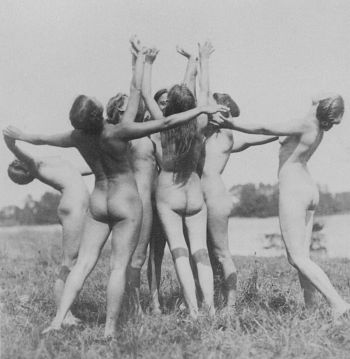
"Owen’s naïve belief in the power of rational humanism was eventually denigrated by Karl Marx and Freidrich Engels; but Engels once wrote of Owen that, in the early 18th century, all social movements and all real advance made in England in the interest of the working class were associated with Robert Owen’s name."
“Owen rebelled against the “trinity of evils:” private property, irrational systems of religion, and marriage founded on property and religion. He developed a plan of progressive paternalism in his commune at “New” Harmony– curfews, house inspections, and fines for drunkenness and illegitimate children. He equated happiness with docility, and as a result was criticized for condescending to the working class.” But Owen’s character indoctrination irked many parents who rarely saw their children during their years of schooling when Owen would “shield children from the unwanted negative influence of their parents and families.” And although Owen stressed gender equality, girls only studied home economics and had little influence in the politics of New Harmony.
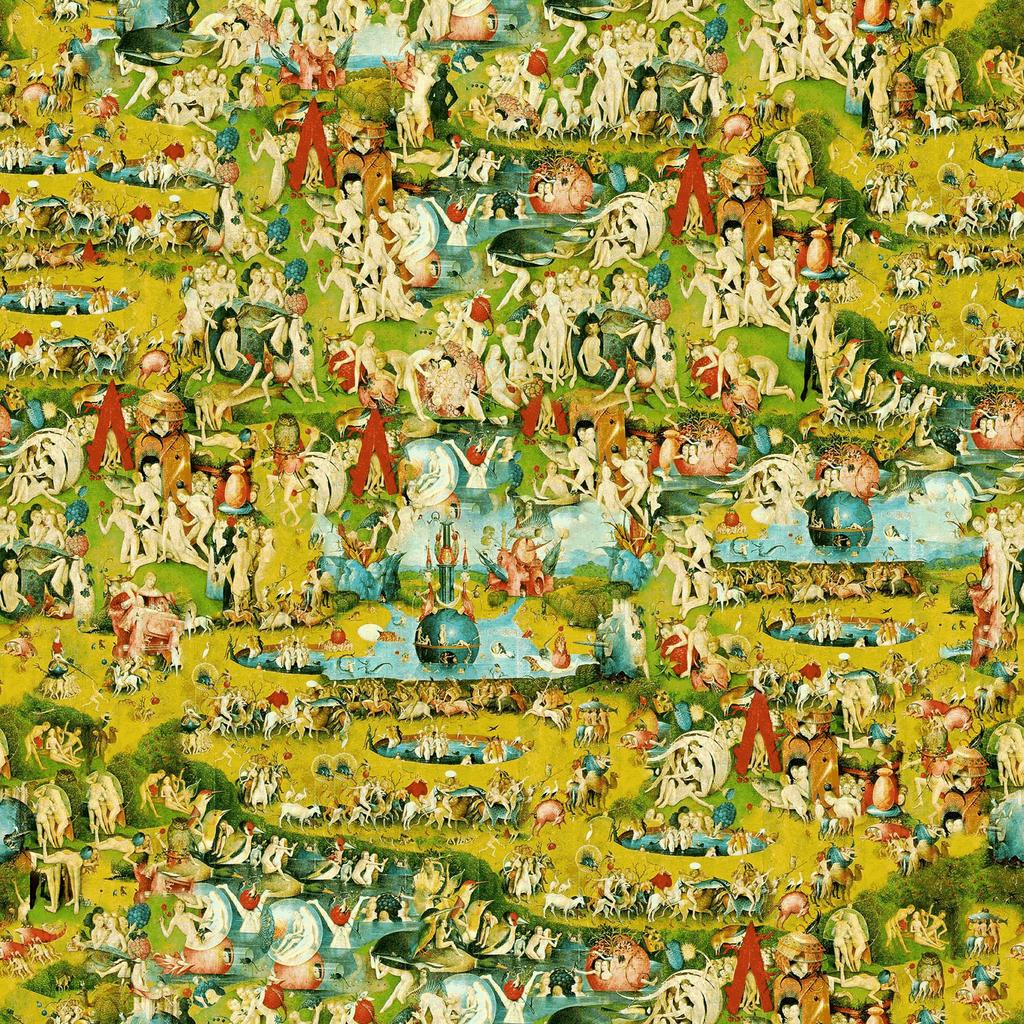
The Garden of Earthly Delights, by Hieronymus Bosch (c. 1504). Art historian Wilhelm Fraenger speculates that Bosch was a sympathiser or member of the free-love sect known as the Brethren of the Free Spirit.
Brook Farm was followed by John Humphrey Noyes, the founding father of the Oneida Community. A product of Yale divinity school, he then converted to fundamentalist Christianity but with a twist: he claimed to have received an epiphany that the Second Coming of Christ had already taken place occurring in the year 70 A.D. and that the Kingdom of Heaven was at hand. He set out to achieve it and was given a boost when Yale revoked his preaching license. Undismayed he started a periodical called “The Witness” which published his views on love and marriage:
“One such convention for which Biblical authority existed was the absence of marriage in Heaven – where ‘they neither marry nor are given in marriage’. The Shakers, who wanted to be celibate, used this text in order to justify their desires: the followers of Noyes, who did not want celibacy, used the same text to support a form of regulated promiscuity. In 1837 ‘The Battle Axe’ published a letter from Noyes explaining his conception of the sexual relations that ought to exist between men and women. In his letter, he stated uncompromisingly that when the will of God is done on earth as it is in Heaven ‘there will be no marriage. The marriage supper of the Lamb is a feast at which every dish is free to every guest. Exclusiveness, jealousy, quarrelling have no place there, for the same reason as that which forbids a guest at a thanksgiving dinner to claim each his separate dish, and quarrel with the rest for his rights. In a holy community, there is no more reason why sexual intercourse should be restrained by law, than why eating and drinking should be – and there is as little occasion for shame in the one case as in the other.’ ”

"Myths, assumptions, and conflicting definitions contributed to various revisionist histories. Filmmaker Jonathan Berman has made a beautiful documentary that depicts the real deals: a group of hippies who formed the Black Bear Ranch commune in Siskiyou County in Northern California in the late '60s. His film COMMUNE is a powerful cinematic story of one attempt amongst countless others to create a separate society based on sharing rather than hoarding, voluntary poverty rather than involuntary servitude, developing relationships through love and empathy rather than envy and competition."
…In the 1640s and 1650s, while Milton was earning a name for himself a prodigious number of utopias were being written and published in England. There were as many as two hundred sects in England in the middle of the century, and almost every sect had its utopia. Most famous among these were Gabriel Plattes’s A Description of the Famous Kingdome of Macaria (1641), Samuel Gott’s Nova Solyma (1648), Gerrard Winstanley’s The Law of Freedom (1652), and James Harrington’s Oceana (1656) . Milton’s response to utopianism was divided.
In Areopagitica he rejected imaginary commonwealths as inefficacious, claiming that to imagine an ideal commonwealth was “to sequester out of the world into Atlantic and Utopian polities, which never can be drawn into use [and] will not mend our condition.” But the previous year in An Apology against a Pamphlet . . . against Smectymnuus, Milton praised More and Bacon for “that great and noble invention which the greatest and sublimes” wits in sundry ages, Plato in Critias, and our two famous countreymen, the one in his Utopia, the other in his new atlantis, chose.” It is possible to assert that Milton’s equivocal admiration for the utopian model persists in Paradise Lost. …

In an act understood to support free love, their child, Mary, took up with the then still-married English romantic poet Percy Bysshe Shelley at a young age. Percy also wrote in defence of free love (and vegetarianism) in the prose notes of Queen Mab (1813), in his essay On Love (c1815) and in the poem Epipsychidion (1821): I never was attached to that great sect, Whose doctrine is, that each one should select Out of the crowd a mistress or a friend, And all the rest, though fair and wise, commend To cold oblivion... Free love has this, different from gold and clay, That to divide is not to take away.
After Noyes wife suffered four miscarriages out of five pregnancies and suffering miserably each time, he was determined not to inflict this upon her again.Noyes practiced and mastered a technique of intercourse that he called male continence. What it amounted to was the development of tremendous control, so that he could make love indefinitely without ever reaching orgasm. With this invention, things moved fast. His small community group of several dozen had shared everything except sex. Now they began to share that too, the males all practicing “continence” under Noyes’s tutorship. He was charged with adultery and moved his Kingdom of Heaven to the Oneida Creek, New York, and began to build the Oneida Community in 1848.
Oneida grew rapidly and prospered; Noyes and his assitants being very shrewd about admittance and making Oneida self supporting. Their internal economy was strictly communistic. Including love. Far from retreating in his advocacy of multiple love affairs for all, Noyes put the scheme on a regular basis. Boys were trained in it- by women who had passed menopause, for obvious reasons- as soonas they reached fourteen; so were girls. Nobody was forced into unwanted relationships , but Noyes reccomended wide circulation for the sake of community coherence. It was all part of their religion, which he called Bible Communism.
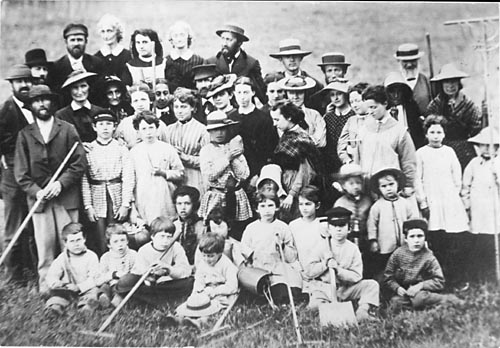
" While no one was obliged, under any circumstances, to receive the attentions of someone whom he or she did not like, the propagation of children was controlled by the elder members of the community. They advised that the young of one sex should be paired off with the aged of the other sex; and at one time twenty-four men and women were specially selected in order to conduct a eugenic experiment designed 'to produce the usual number of offspring to which people in the middle classes are able to afford judicious moral and spiritual care, with the advantage of a liberal education'. "On the whole the system was remarkably successful. Apart from a few sorrows due to the breaking-up of an exclusive attachment, the sexual relations of the members inspired them with a lively interest in each other, and Pierrepont Noyes - one of the sons of John Humphrey - believes 'that the opportunity for romantic friendships also played a part in rendering life more colourful than elsewhere. Even elderly people, whose physical passions had burned low, preserved the fine essence of earlier associations."
Later when it was decided that the time had come to raise a new generation of Oneidans, mates were chosen deliberately in order to form “scientific combinations” , with Noyes doing most of the choosing. He chose himself as the appropriate male in nine cases, although he was by now in his sixties. This extraordinary experiment in eugenics resulted in fifty- four chldren, none of them defective and most of them extremely bright. Eventually a campaign of persecution by denunciation began and Noyes moved to Canada at the age of sixty-eight to avoid legal action. He tried to direct the affairs from a distance, but this worked badly. Community sex was given up and the economic communism was dissolved. Noyes died, still an exile, in 1886. The most revolutionary and promising alternative community of the nineteenth-century had, after all, come to a rather early end.
…The freedom Milton hailed in politics and religion also meant, to the poet, the freedom to fall. He views liberty not as a stroll in the garden but as the root of tragedy – a necessary, uplifting tragedy. Doomed to freedom, Eve and Adam leave paradise to find that the story of humankind begins. “The world was all before them” – the same world of choice, conflict and difficult togetherness that Milton’s heirs, from Jefferson to Pullman, have sought to interpret by his lights. “They hand in hand with wandering steps and slow/ Through Eden took their solitary way.”

"...Most of those communities are gone, as is the "hippie commune" label, overburdened as it was with stereotypes about free-flowing sex and drugs. Today, Morninglory and a couple of others are alive and well, "intentional community" is the preferred term, the "herbs" are mostly for eating or medicine, and the sons and daughters of hippies have grown into adulthood on the farm and are parenting a third generation. More than that, some of the flower children of the '60s are feeling vindicated by a growing concern about the very things they rebelled against: rampant consumerism, waste and environmental degradation. At a time that has seen An Inconvenient Truth capture an Oscar, and the U.S. get bogged down in another foreign war, the idea of finding a better way to live has found new currency."
Michel Foucault:”First of all, the utopias. These are arrangements which have no real space. Arrangements which have a general relationship of direct or inverse analogy with the real space of society. They represent society itself brought to perfection, or its reverse, and in any case utopias are spaces that are by their very essence fundamentally unreal.
There also exist, and this is probably true for all cultures and all civilizations, real and effective spaces which are outlined in the very institution of society, but which constitute a sort of counter arrangement, of effectively realized utopia, in which all the real arrangements, all the other real arrangements that can be found within society, are at one and the same time represented, challenged, and overturned: a sort of place that lies outside all places and yet is actually localizable. In contrast to the utopias, these places which are absolutely other with respect to all the arrangements that they reflect and of which they speak might be described asheterotopias.
Between these two, I would then set that sort of mixed experience which partakes of the qualities of both types of location, the mirror. It is, after all, a utopia, in that it is a place without a place. In it, I see myself where I am not, in an unreal space that opens up potentially beyond its surface; there I am down there where I am not, a sort of shadow that makes my appearance visible to myself, allowing me to look at myself where I do not exist: utopia of the mirror. At the same time, we are dealing with a heterotopia. The mirror really exists and has a kind of comeback effect on the place that I occupy: starting from it, in fact, I find myself absent from the place where I am, in that I see myself in there.”
ADDENDUM: “This pessimism is opposed to positive optimism and utopianism, but is not opposed to negative utopianism, through which Benjamin recovers the “principle of hope”- as named by Ernst Bloch. During this period, Adorno and Horkheimer still embraced a positive utopianism, and explicitly relied on an optimistic conception of progress. In this matter, Benjamin preceded Adorno’s and Horkheimer’s second phase of thought, clearly expressed later in the Dialectic of Enlightenment (1944) Benjamin’s “Theological-Political Fragment” is especially devoted to encoding the set of relations between these two elements in his thought.
“Only the messiah himself can close all historical events, and he does so by redeeming, completing, and creating their relation to the messianic dimension. For this reason nothing historical by itself is able to relate itself to something messianic. This is why God’s kingdom is not the goal of historical dynamics; it cannot be assigned as a goal. From the historical point of view it is not a goal but a termination. This is why the profane order cannot be erected while relying upon the idea of God’s
kingdom.”
Benjamin presented the primacy of the theological dimension in the pessimistic conception of “eternal fall” from paradise into history which promises “happiness.” While the locus of the messianic dimension is man’s inwardness – secluded, suffering, projected towards eternity- Benjamin regards the messianic world, and not the real political one, as a “world of all around and integral actuality. Only in it is there universal history.”








 COMMENTS
COMMENTS




We might all be utopian in a certain way, or more likely, libertarian, we desire freedom and privacy, and the more these are shared with the familiar, the more we are fulfilled.
“Only the messiah himself can close all historical events, and he does so by redeeming, completing, and creating their relation to the messianic dimension. For this reason nothing historical by itself is able to relate itself to something messianic. This is why God’s kingdom is not the goal of historical dynamics; it cannot be assigned as a goal. From the historical point of view it is not a goal but a termination. This is why the profane order cannot be erected while relying upon the idea of God’s
kingdom.”
Nice quote.
Amazing and thanks for sharing. It could be the preamble to this article.